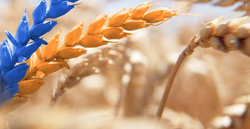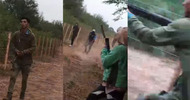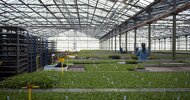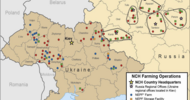IP Nederland | May 2014

Rabo Farm interview with IP Nederland
Gerd Boeckenhoff, CIO of Rabo Farm was interviewed on the launch of a new Rabo Farm Europe Fund II (RFEFII) by IP Nederland (IPN). The interview was published in the April/May 2014 edition of IPN. Gerd Boeckenhoff stressed that the focus is on Central and Eastern EU as there is a huge agricultural potential in this region. There are plenty of possibilities to improve productivity, efficiency and sustainability of existing farms. Below you find the English translation of the article.
Key facts RFEFII
Maturity: 10-14 years
Fund size: €300 million
70% Poland & Romania; 30% other CE EU countries;
Minimum investment € 50 million
Farm investments
‘As you sow, so shall you reap’ goes the old adage. And Rabo Farm knows how true it is: the manager is investing in farms to harvest a responsible return for institutional investors. Now that the first RFEF has been fully subscribed, the manager is launching a second. After all, in order to harvest, you must sow.
The beautiful thing about farmland is that you never have the problem of vacancy. Good land never lies fallow," says Gerd Boeckenhoff, himself the son of a farmer and CIO of Rabo Farm since 2009.
Rabo Farm invests directly in arable farms in central and eastern Europe, particularly in Poland and Romania, by purchasing farms and leasing them to mostly local farmers. The Rabo Farm Europe Fund I (RFEFI) invests in local farms which it modernises, expands and turns a profit on. The Rabo subsidiary is thriving: over the course of this year, the RFEFI, with a size of € 315 million, will be fully subscribed, and a new fund, the Rabo Farm Europe Fund II (RFEFII), will be launched.
"Compared to a traditional property investment, this is a liquid investment," says Boeckenhoff. "There are no project developers, but plenty of potential lessees and the supply of this ‘productive’ asset cannot be easily expanded. There are none of the more laborious aspects of the property market to deal with. And so you are protected from the usual cyclical market fluctuations."
Returns from open fields
The appreciation of land prices, rather than rental income, is playing a greater role in agricultural investments. "Prices continue to rise relatively steadily. And we generate extra return by raising productivity,” explains Boeckenhoff. "Agricultural land in central and eastern Europe is very much underused. The yield per hectare in the Netherlands, for example, is 10 to 11 tonnes of grain compared to just 3 tonnes in Romania. Rabo Farm adds value by substantially raising the yield per hectare."
Contrary to what is sometimes thought, that added value is not so much the provision of expertise. “The requisite expertise is often already available. What is lacking, however, is capital." This is the capital required, for example, to purchase numbers of smaller plots with a view to combining them, to modernise the infrastructure or to make investments in drainage or storage facilities. There is also a lack of capital to address the consequences of pollution: "We advocate sustainability. So when we modernise a farm, we go about it in a sustainable and environmentally friendly manner."
Better productivity often means larger-scale operations. But does that not also mean a loss of jobs and hence bad blood among the small local farmers?
"Job losses have not been severe. The real blow to employment came when the Soviet Union collapsed and the large state-owned companies were shut down. In that respect, the scaling up of the farms currently under way is having little adverse impact. We often actually create employment since we make a point of engaging local people for the infrastructure and construction projects. And owing to the lower risks involved in the long-term leases we offer, as opposed to short-term leases, our lessees are prepared to hire more workers."
The local communities are generally happy with Rabo Farm. “We also try to give something back. Recently we replaced the asbestos roof of a farm – quite an operation owing to the degree of care demanded. As the adjacent town hall had the same type of roof, we decided to replace it as well. Things like that are appreciated," says Boeckenhoff. But it is the farms themselves that provide the best advertisement. "The fields are golden yellow with corn ready to be harvested. The silos gleam in the sun. It’s a beautiful sight. People drive by and see it with their own eyes. They need no more convincing than that."
Conservative
Since first investing five years ago, Rabo Farm has established a good reputation in its core focus countries. "Farmers in Poland and Romania now know who we are. And we, for our part, have found our feet in these countries,” says Boeckenhoff. In addition to Rabo, three large pension funds are participating in the RFEFI. Investors of similar calibre will invited to participate in RFEFII, the primary focus of which will also be on these same two countries.
"While our eyes are certainly not closed to the surrounding countries, including the Baltic states and Slovakia, we are conservative and currently prefer to stick with the two countries where we have really established ourselves. Besides, the need for investment there remains substantial,” according to Boeckenhoff.

This year Rabo Farm's first fund, with a size of € 315 million, will be fully subscribed, and a new fund, the Rabo Farm Europe Fund II (RFEFII), will be launched.
Rabo Farm interview with IP Nederland
Gerd Boeckenhoff, CIO of Rabo Farm was interviewed on the launch of a new Rabo Farm Europe Fund II (RFEFII) by IP Nederland (IPN). The interview was published in the April/May 2014 edition of IPN. Gerd Boeckenhoff stressed that the focus is on Central and Eastern EU as there is a huge agricultural potential in this region. There are plenty of possibilities to improve productivity, efficiency and sustainability of existing farms. Below you find the English translation of the article.
Key facts RFEFII
Maturity: 10-14 years
Fund size: €300 million
70% Poland & Romania; 30% other CE EU countries;
Minimum investment € 50 million
Farm investments
‘As you sow, so shall you reap’ goes the old adage. And Rabo Farm knows how true it is: the manager is investing in farms to harvest a responsible return for institutional investors. Now that the first RFEF has been fully subscribed, the manager is launching a second. After all, in order to harvest, you must sow.
The beautiful thing about farmland is that you never have the problem of vacancy. Good land never lies fallow," says Gerd Boeckenhoff, himself the son of a farmer and CIO of Rabo Farm since 2009.
Rabo Farm invests directly in arable farms in central and eastern Europe, particularly in Poland and Romania, by purchasing farms and leasing them to mostly local farmers. The Rabo Farm Europe Fund I (RFEFI) invests in local farms which it modernises, expands and turns a profit on. The Rabo subsidiary is thriving: over the course of this year, the RFEFI, with a size of € 315 million, will be fully subscribed, and a new fund, the Rabo Farm Europe Fund II (RFEFII), will be launched.
"Compared to a traditional property investment, this is a liquid investment," says Boeckenhoff. "There are no project developers, but plenty of potential lessees and the supply of this ‘productive’ asset cannot be easily expanded. There are none of the more laborious aspects of the property market to deal with. And so you are protected from the usual cyclical market fluctuations."
Returns from open fields
The appreciation of land prices, rather than rental income, is playing a greater role in agricultural investments. "Prices continue to rise relatively steadily. And we generate extra return by raising productivity,” explains Boeckenhoff. "Agricultural land in central and eastern Europe is very much underused. The yield per hectare in the Netherlands, for example, is 10 to 11 tonnes of grain compared to just 3 tonnes in Romania. Rabo Farm adds value by substantially raising the yield per hectare."
Contrary to what is sometimes thought, that added value is not so much the provision of expertise. “The requisite expertise is often already available. What is lacking, however, is capital." This is the capital required, for example, to purchase numbers of smaller plots with a view to combining them, to modernise the infrastructure or to make investments in drainage or storage facilities. There is also a lack of capital to address the consequences of pollution: "We advocate sustainability. So when we modernise a farm, we go about it in a sustainable and environmentally friendly manner."
Better productivity often means larger-scale operations. But does that not also mean a loss of jobs and hence bad blood among the small local farmers?
"Job losses have not been severe. The real blow to employment came when the Soviet Union collapsed and the large state-owned companies were shut down. In that respect, the scaling up of the farms currently under way is having little adverse impact. We often actually create employment since we make a point of engaging local people for the infrastructure and construction projects. And owing to the lower risks involved in the long-term leases we offer, as opposed to short-term leases, our lessees are prepared to hire more workers."
The local communities are generally happy with Rabo Farm. “We also try to give something back. Recently we replaced the asbestos roof of a farm – quite an operation owing to the degree of care demanded. As the adjacent town hall had the same type of roof, we decided to replace it as well. Things like that are appreciated," says Boeckenhoff. But it is the farms themselves that provide the best advertisement. "The fields are golden yellow with corn ready to be harvested. The silos gleam in the sun. It’s a beautiful sight. People drive by and see it with their own eyes. They need no more convincing than that."
Conservative
Since first investing five years ago, Rabo Farm has established a good reputation in its core focus countries. "Farmers in Poland and Romania now know who we are. And we, for our part, have found our feet in these countries,” says Boeckenhoff. In addition to Rabo, three large pension funds are participating in the RFEFI. Investors of similar calibre will invited to participate in RFEFII, the primary focus of which will also be on these same two countries.
"While our eyes are certainly not closed to the surrounding countries, including the Baltic states and Slovakia, we are conservative and currently prefer to stick with the two countries where we have really established ourselves. Besides, the need for investment there remains substantial,” according to Boeckenhoff.












